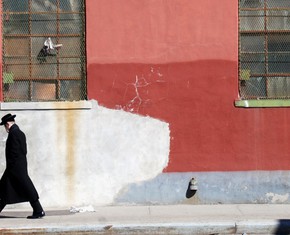The views expressed in our content reflect individual perspectives and do not represent the authoritative views of the Baha'i Faith.
Not too far from where I live, I recently walked through a clear-cut forest—or tried to. If you’ve ever seen the results of clear-cutting, you already know what I mean.
It’s almost impossible to step through such destruction. The huge machines logging companies use to fell and remove trees rip up the ground, leaving deep furrows and holes. Since they were cut down for the commercial value of their wood, the trunks of trees are missing from clear-cut forests—but the branches, needles and cones remain, littering the ground everywhere like the bones of the dead, and making it near impossible to traverse what used to be a forest. Of course, the animals—birds, insects, mammals—all flee, as you would if your home was destroyed. What’s left? Well, it looks like a trash dump, because that’s what it is, but unlike a dump it’s strangely silent. No flies buzz, no birds chirp, nothing moves.
While I tried to walk through that ugly slash on a formerly green mountainside, I thought about what material civilization does to our world. I grieved for the death and destruction I saw, and wondered how we could prevent it. I recalled Albert Einstein’s keen observation: “It has become appallingly obvious that our technology has exceeded our humanity.” Most of all, though, I remembered this quotation from the Baha’i teachings:
… shouldst thou turn thine eye to the discovery of destructive and infernal machines, to the development of forces of demolition and the invention of fiery implements, which uproot the tree of life, it would become evident and manifest unto thee that civilization is conjoined with barbarism. Progress and barbarism go hand in hand, unless material civilization be confirmed by Divine Guidance, by the revelations of the All-Merciful and by godly virtues, and be reinforced by spiritual conduct, by the ideals of the Kingdom and by the outpourings of the Realm of Might. – Abdu’l-Baha, Selections from the Writings of Abdu’l-Baha, p. 284.
It has become obvious that the technologically-advanced, industrialized civilization we human beings have built during the past couple of centuries has become a “fiery implement” that threatens to destroy us, uprooting the tree of life. Progress and barbarism, indeed.
We could, if we allowed it to happen, destroy ourselves. We have come to that point in human development. Nuclear, biological and chemical weapons; climate change; unbelievably rapid deforestation; the accelerating extinction of species; the warming and acidification of the world’s oceans; the growing threat of global terrorism; the burden on humanity of the vast extremes of wealth and poverty; deep, violent racial and religious animosities; not to mention the pressures exerted by the world’s population of 11 billion people by the end of this century—all of those human problems, which the Baha’i teachings call “the malignant fruits of material civilization,” have the power to end human society as we know it.
Humanity, like so many other species before us, is at risk of extinction.
These “malignant fruits” have convinced many a profound thinker that we are not progressing, but instead digressing, moving backwards towards our eventual extinction:
Man has been endowed with reason, with the power to create, so that he can add to what he’s been given. But up to now he hasn’t been a creator, only a destroyer. Forests keep disappearing, rivers dry up, wildlife’s become extinct, the climate’s ruined and the land grows poorer and uglier every day. – Anton Chekhov
I don’t agree with you in saying that in all human minds there is poetry. Man as he came from the hand of his Maker was poetic in both mind and body, but the gross heathenism of civilization has generally destroyed nature, and poetry, and all that is spiritual. – John Muir
Humanity is a biological species, living in a biological environment, because like all species, we are exquisitely adapted in everything: from our behavior, to our genetics, to our physiology, to that particular environment in which we live. The earth is our home. Unless we preserve the rest of life, as a sacred duty, we will be endangering ourselves by destroying the home in which we evolved, and on which we completely depend. – Edward O. Wilson
The Baha’i teachings say that ongoing material progress without a parallel development of equivalent spiritual progress can only threaten us further:
Two calls to success and prosperity are being raised from the heights of the happiness of mankind, awakening the slumbering, granting sight to the blind, causing the heedless to become mindful, bestowing hearing upon the deaf, unloosing the tongue of the mute and resuscitating the dead.
The one is the call of civilization, of the progress of the material world. This pertaineth to the world of phenomena, promoteth the principles of material achievement, and is the trainer for the physical accomplishments of mankind. It compriseth the laws, regulations, arts and sciences through which the world of humanity hath developed; laws and regulations which are the outcome of lofty ideals and the result of sound minds, and which have stepped forth into the arena of existence through the efforts of the wise and cultured in past and subsequent ages. The propagator and executive power of this call is just government.
The other is the soul-stirring call of God, Whose spiritual teachings are safeguards of the everlasting glory, the eternal happiness and illumination of the world of humanity, and cause attributes of mercy to be revealed in the human world and the life beyond.
This second call is founded upon the instructions and exhortations of the Lord and the admonitions and altruistic emotions belonging to the realm of morality which, like unto a brilliant light, brighten and illumine the lamp of the realities of mankind. Its penetrative power is the Word of God.
However, until material achievements, physical accomplishments and human virtues are reinforced by spiritual perfections, luminous qualities and characteristics of mercy, no fruit or result shall issue therefrom, nor will the happiness of the world of humanity, which is the ultimate aim, be attained. For although, on the one hand, material achievements and the development of the physical world produce prosperity, which exquisitely manifests its intended aims, on the other hand dangers, severe calamities and violent afflictions are imminent. – Abdu’l-Baha, Selections from the Writings of Abdu’l-Baha, pp. 283-284.
We face “… dangers, severe calamities and violent afflictions,” Abdu’l-Baha wrote, if we continue allowing unrestrained material progress to go forward without a spiritual counterpart. Like a small child with a lethal weapon, the world has the capacity to destroy itself, but so far lacks the spiritual and moral maturity to understand the consequences.
So how do human beings progress spiritually? What can we do, as a race, to increase our moral capacities? How can we match material progress with spiritual growth? In the next essay in this series, we’ll explore those questions, and see if the answers can lead us to peace.
















Comments
Sign in or create an account
Continue with Googleor